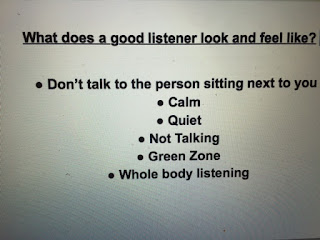In the past two months our first grade social detectives continued to learn about expected behaviors in our Conversation and Greeting Skills Unit. We have learned about a
lot of new tools to help use those expected behaviors. When learning about personal space, our social detectives practiced using rulers to determine the amount of personal they needed to feel comfortable. Personal space is an expected behavior that leads to us and our friends having comfortable thoughts and feelings. We learned that everyone needs different amounts of personal
space and that this need can also change based on who is surrounding us. It is
important to use our social detective skills to know how much personal space a
person needs.
 |
| Social Detectives observing that Ms. Casavant needs more personal space than Mrs. Terrio |

We learned the importance of making sure we face the person we are talking with and using eye contact to show that we are interested in what they have to say. When having a conversation it is expected to use a medium volume and friendly tone. Our Social Detectives explored how to stay on topic or change the topic of conversation.
To stay on topic we talk about the same thing. For example if Ms. Casavant is talking about her favorite football team with Mrs. Terrio, then Mrs. Terrio should talk about a favorite football team as well. Everyone learned that we need to:
listen
to the person talking,
Answer/ Respond to
them and then
Wait for a
pause or break before changing to a new topic. We enjoyed practicing these skills each week through social-role plays. Social Detectives would practice the expected way to greet and have a conversation.
 |
| Mrs. Conway's Class thinks good listeners.... |
Then our Social Detectives brainstormed a list of what good listeners looked and felt like. After we read the book “My Mouth is a Volcano” by
Julia Cook and then discussed how to be a good listener by using our whole
body listening and not interrupting others when they talk. In this story a boy named Louis always interrupted. He learned the hard way when his friend interrupted his special presentation that interrupting is unexpected and leads to uncomfortable thoughts and feelings. His mom taught him to use the strategy of taking a deep breath whenever he felt he might interrupt. The Social Detectives completed a training assignment that required them to be on the lookout for strategies they could use when they though their volcanoes might erupt (interrupt) like Louis'. Ask your child what strategy they like to use!

During the months of March and April our focus will be game
playing skills. Our fellow Social Detectives will learn strategies to decide
who goes first or who gets to choose using the Who Goes First Wheel. We will discuss how to invite a friend to
play using all of our previously learned conversation skills. Using the
Model Me Kids Videos for Teaching
Social Skills by Example we will learn what to do when you ask a friend to play
and they say no. This will also include when it is okay to say no to a friend,
such as when it is a DOUBLE D (dangerous or destructive) or a promise was made
to play with someone else. Other skills included in this unit will be how to
establish and renegotiate the rules of a game/activity, joining an existing
game and what to do when you feel left out. Our Social Detectives will continue
to watch the adults model these skills and will have the opportunity to
role-play these skills together.
Now that the weather is getting warmer we will be able to
spend more time outside practicing all the skills we have learned. During these
two months we will focus on teaching our Social Detectives how to play Solution
Wheel Tag. If you would like to learn how to play this at home check out the parent resource tab for the instructions. You will also see an update to the books and great article on guidelines for playdates.
Thank you for visiting our blog! Feel free to comment about what our Social Detectives have been busy learning about.
-Mrs. Bonenfant, Ms. Casavant and Mrs. Terrio

























